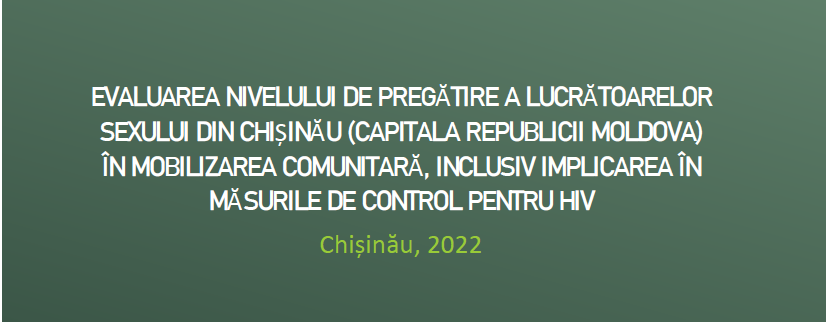News
Assessment of the level of training of sex workers in Chisinau (capital of the Republic of Moldova) in Community Mobilization, including involvement in HIV control measures
AFI with the financial and technical support of UNAIDS Moldova conducted the study "Assessment of the level of training of sex workers in Chisinau (capital of the Republic of Moldova) in Community Mobilization, including involvement in HIV control measures". The study was conducted between October and December 2021 and included a sample of 355 female sex workers, having previously been approved by the National Research Ethics Committee.
This study aimed to assess the level of preparedness of sex workers in community mobilization, including involvement in HIV control measures. Complementary to the intended purpose, the present research also highlighted the profile of sex workers (SWs) and other aspects of vulnerability for these groups.
The study highlighted the following aspects.
General aspects:
- Younger age of majority for first sexual contact, including providing services for money or other benefits.
- SW monthly net income higher than the average gross nominal monthly earnings in the economy (9116 lei for 2021).
- The educational level of most of the SW is from 4 to 11 grades, it is suggested that the possibility that they could have a net income of less than 5000 lei.
- The unstable place of train could be explained by the need to have a place to live, as they came to Chisinau municipality from other localities, but by the fear of being discovered their activity.
- The vast majority of SW want the legalisation of sexual services.
Reproductive health
- The use of contraceptive methods by all participants in the study, reports on the success of prevention programmes carried out in the framework of risk prevention projects in the Republic of Moldova, which are implemented through NGOs.
- The research highlights the gap between the number of pregnancies and the number of children born.
- 1/3 of the children live with their mother (SW woman), the others live elsewhere, being in most cases left in the care of grandparents or other relatives or friends.
Alcohol consumption
- SW consumes alcohol both before and after services are provided, often more frequently after services are provided.
- Increased frequency of alcohol consumption in case of physical and/or sexual abuse by partner/client.
Health services
- Access to health services by SW highlighted the effectiveness of harm reduction programmes, noting that in the majority of cases the health tests listed by SW as having been carried out in the last 12 months were those provided through such programmes (pregnancy test and HIV test).
- With reference to HIV status, in most cases SW do not ask the client to disclose their status.
- Being registered with the family doctor and having a health insurance policy were not a high priority among SW working in the Chisinau municipality.
- SW were willing to take part in training programmes in the field of health, legislation on sexual services, the right to health.
Violence against LS
- SW in the study experience violence virtually all the time. They have mostly been subjected to physical violence since childhood, at ages younger than 15 years.
- Sexual violence, another SW confrontation. The study found, including sexual violence under the age of 15, but also partner/partner violence in the last 12 months.
- SW exposure to violence is associated with negative health outcomes such as: increased prevalence of sexually transmitted infections, including HIV; poor psycho-emotional health; increased alcohol or drug abuse.
- The vast majority fear that if they are disclosed they will be rejected, isolated and ignored.
- High prevalence of sexually transmitted infections [34], exposure to violence [34,35]. It is also highlighted that in countries/states that have criminalised the profession, this has led to stigmatising attitudes and biased views towards SW.
Psychological aspects
- Presence of credibility in predetermination and chance, but also a low level of self-determination of SW are some of the psycho-emotional elements highlighted by the present research.
- traumatic experiences (both in early childhood and in adulthood while engaging in sex work) contribute to mental illness among SW.
- The present research reveals that the level of self-efficacy or confidence in one's ability to accomplish a task or achieve a goal among SW is quite low.
- Research shows low levels of empowerment (persuasive power) among SW.
To access the full study (in Romanian, the English version will be uploaded shortly), please visit:
Other news
- 18 July 2022Ensuring access for psychological, sexual reproductive health and HIV prevention services for Adolescent Girls and Young Women refugees with a focus on key and vulnerable populations (people living with HIV, children and adolescents, women etc)
- 14 April 2022A pilot implementation study to scale-up methadone in incarcerated persons with opioid use disorder and retain them on treatment after release in Moldova
- 10 February 2022Importance of authority’s involvement in tuberculosis care during COVID-19 pandemic

